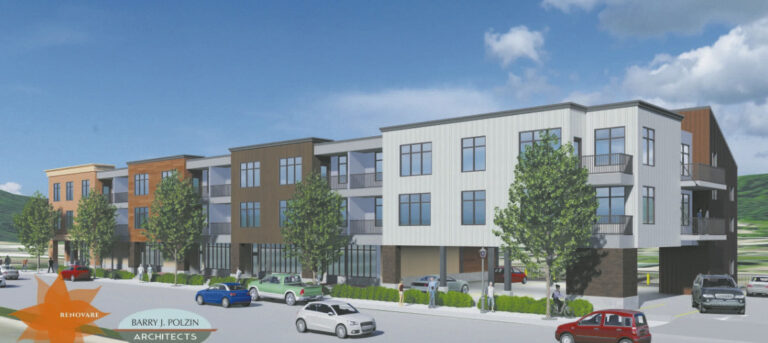Three years after securing initial support, the Munising Marketplace project has received $500,000 in predevelopment loans — including $125,000 from the Alger County Land Bank and $375,000 from the Michigan State Land Bank — but it still faces a $4.7 million funding gap as it races toward a Dec. 31 closing deadline.
To help close part of that gap, the development team is preparing to launch a public equity crowdfunding campaign — a strategy that opens the door for community members to invest directly in the project.
Rather than relying solely on traditional loans or government subsidies, the approach allows individuals to buy a stake in the development itself, with the potential for a financial return if it succeeds.
During a virtual meeting of the Munising Marketplace Committee on July 16, project lead Jill Ferrari of Renovare Development walked members through progress on the $15 million workforce housing and commercial development.
The effort, originally announced in 2022 with a projected $18 million price tag and 36 housing units, has since been scaled to 32 units and adjusted to reflect new financing realities.
“We really need to allow the public to have an opportunity to invest and start generating momentum,” Ferrari said of the crowdfunding campaign, adding that visible local support could also strengthen the project’s standing in competitive state-level funding decisions.
Hosted by the Alger County Clerk’s Office, the July meeting included representatives from local, regional and state agencies: Alger County Commissioner Dean Seaberg; Munising City Commissioner Rod Des-Jardins; Katherine Reynolds, executive director of the Munising DDA and Greater Munising Bay Partnership; Anne Giroux, director of development and investment services for Invest-UP; and Joseph Rivet, executive director of the Michigan State Land Bank Authority.
The original vision, as outlined in the 2022 announcement from the Michigan Department of Labor and Economic Opportunity, positioned the Marketplace as a mixed-use catalyst for workforce development.
The project proposed a three-story building with a ground-floor workforce development center and commercial space, along with residential units reserved in part for tenants earning under 80% of the area median income. The commercial space would be master-leased and managed by Michigan-Works!, providing job training, youth programming and employer- driven hiring support.
Ferrari said the current design still honors that mission, though some elements have shifted.
The revised plans call for a slightly smaller fresh market space, the addition of a co-working area and potential inclusion of a workforce center.
The Sault Ste. Marie Tribe of Chippewa Indians has formally joined the project as a partner and is preparing to launch a press release through its legislative office.
The tribe’s participation opens the door to additional scoring benefits under Michigan’s Low-Income Housing Tax Credit program, or LIHTC, though Ferrari emphasized that any setasides for tribal members are state-imposed and minimal.
Seaberg raised concerns about transparency and land bank consultation related to those stipulations. Ferrari agreed to circulate the memorandum of understanding with the tribe and clarify how the LIHTC scoring works.
The project currently faces a $4.7 million gap, assuming it secures 4% LIHTC equity and debt support under existing terms.
Ferrari said the team is pursuing several paths to close the shortfall, including potential energy tax credits, enhancement grants through the state Legislature and renewed engagement with the Michigan Economic Development Corp.
Reynolds asked whether the land extension had been formally approved. Ferrari confirmed the extension had been triggered in writing and that Munising Lands was comfortable with the terms.
Seaberg reiterated the county’s commitment.
“We’ve got a considerable amount of money locked into this project,” he said. “The sooner we get it done, the sooner we can move on to other things.”
Ferrari also floated the idea of involving a local lender — such as Northern Initiatives in Marquette — in a portion of the commercial debt.
“It could trigger additional incentives and bring in a community lending partner,” she said. She asked for help connecting with the lender’s leadership.
Looking ahead, the committee confirmed upcoming meetings on Aug. 20 and Sept. 17. A possible in-person meeting on Oct. 8 was discussed, depending on scheduling and lodging availability.
Ferrari said the team plans to launch a social media and public engagement campaign to build broader community awareness and support. She noted that the group had intentionally held off on public messaging.
“We’ve been quiet during this period until we knew we had a full team together,” she said, adding that marketing and communications efforts will ramp up in the coming weeks.
